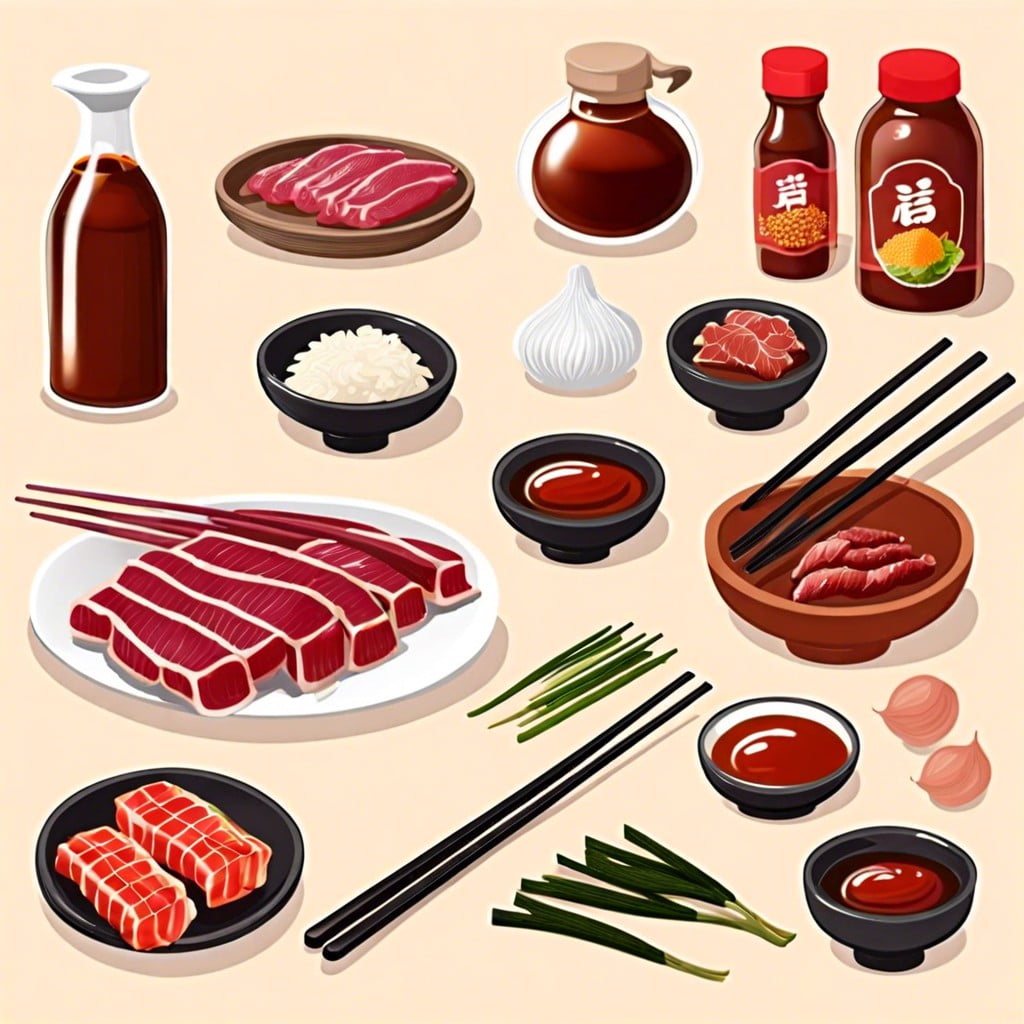Get ready to discover the bold flavors that define Korean BBQ and how you can recreate them at home.
Key takeaways:
- Korean BBQ sauce combines sweet, savory, and tangy flavors.
- Making Korean BBQ sauce at home is easy and rewarding.
- Use Korean BBQ sauce to enhance grilled meats, vegetables, and burgers.
- Galbi, made from beef short ribs, is a must-try Korean BBQ dish.
- Daeji Bulgogi, a spicy pork dish, balances heat and sweetness.
Korean BBQ Sauce Ingredients

Dive straight into the vibrant constellation of flavors that make up Korean BBQ sauce; it’s the lifeblood that gives dishes their distinct deliciousness. Balanced sweet and savory notes come from brown sugar and soy sauce, respectively. Pear puree, a secret weapon often used in Korean marinades, introduces a subtle sweetness while tenderizing the meat. Fresh garlic and ginger deliver a one-two punch of spice and warmth, pivotal to creating that authentic taste profile. Gochujang, a fermented chili paste, and sesame oil are the dynamic duo contributing depth and a nutty undertone while rice vinegar imparts a tangy edge to cut through richness. With a splash of water to meld the ingredients, these elements converge to create a sauce that’s bold, complex, and the perfect complement to any Korean BBQ endeavor.
How to Make Korean BBQ Sauce
Crafting this flavor bomb at home is a walk in the park. Put on your chef’s hat and gather soy sauce, brown sugar, garlic, ginger, sesame oil, and a smidgen of Gochujang or red pepper flakes for heat.
Begin with the soy sauce as your canvas, adding savory depth. Brown sugar joins the party to balance with a sweet note. Now, for the garlicky punch and the warm, spicy hug of ginger – don’t be shy. In goes the sesame oil, drizzling in a nutty whisper.
The Gochujang or red pepper flakes? That’s the sizzle, the spark. A dollop or a sprinkle, and you’re dancing through the flames of flavor. Simmer all elements together, letting them mingle until the sauce thickens enough to coat the back of a spoon. Voilà! The magic potion is ready for action.
Remember, patience is a virtue here; give those ingredients time to get to know each other, and you’ll be rewarded with a sauce that’s not just good, it’s “steal the show” good.
How to Use Korean BBQ Sauce
Slather it on the grill – As proteins sizzle over flames, basting them in Korean BBQ sauce imparts a rich, caramelized sheen. Try it with beef or chicken; the sugars in the sauce will caramelize beautifully, creating an irresistible, smoky crust.
Marinate to magnify – Immersing meats in Korean BBQ sauce for several hours, or even overnight, infuses them with deep, savory notes. Your ribs or skewers will thank you, each bite exuding that sweet and salty harmony characteristic of Korean cuisine.
Dress up veggies – Vegetarian? No problem. This versatile sauce can amp up the flavor of grilled vegetables or tofu. Brush bell peppers, mushrooms, or zucchini with the sauce before grilling, and watch them transform into delicacies with a Korean twist.
Dip to delight – Serve the sauce on the side as a dip. It’s a crowd-pleaser, making egg rolls, dumplings or even simple crudités feel like a street food adventure through Seoul.
Boost your burgers – Swap out the typical ketchup and mustard for a slathering of Korean BBQ sauce on your next burger. Whether beef, chicken, or plant-based, you will elevate your patty game to new heights.
Incorporate in stir-fries – A splash of Korean BBQ sauce while stir-frying can harmonize disparate ingredients. It brings together proteins, noodles, and vegetables, marrying them in a symphony of flavor.
Korean BBQ Galbi
If you’re looking to add some sizzle to your barbecue lineup, Galbi, a beloved Korean BBQ staple, is a perfect choice. Often made from beef short ribs, these delectable morsels are marinated in a sweet and savory mixture that’s hard to beat. The defining characteristic is the tantalizing blend of soy sauce, pear juice for tenderizing, a kiss of sugar for caramelization, and a flirt with garlic and sesame oil for depth.
When preparing Galbi, remember the cut is critical—the thinner, the better for quick grilling. It’s a tango of taste and texture, with the meat soaking up the marinade overnight, ensuring each bite is packed with flavor. Grilling over a high flame will reward you with a delightful char that contrasts the juicy inside. Mastering Galbi is like playing a symphony with fire; it’s all about harmony between marinade and meat, the rhythm of the grill, and the resulting symphony of flavors on your plate.
Daeji Bulgogi (Pork Bulgogi)
This fiery dish stands out in the Korean barbecue lineup, marrying heat with a sweet backdrop. It starts with thinly sliced pork, coated in a spicy marinade that sings with gochujang (Korean red chili paste) — the hero that delivers a punch. The sauce is no wallflower either, playing a symphony of flavors with garlic, ginger, and a hint of sugar, along with soy sauce for that savory note.
Marinating time is key, as it lets the heat and sweet infuse deep into the meat. Aim for at least two hours, but if you’re really after a flavor jackpot, let it sit overnight. The pork then hits the grill, sizzling away until it’s charred at the edges, caramelized and beckoning.
Don’t fret over the spice; it’s manageable and balanced. Paired with a bowl of steamed rice or wrapped in lettuce, each bite is a tango of flavors. It’s not just hot, it’s a warming embrace of spice that transforms the humble pork into a dish with a lively kick.

